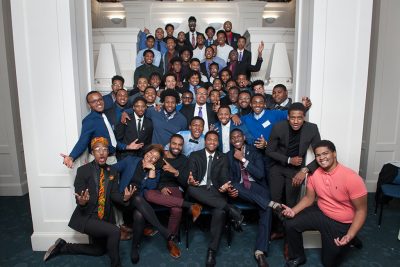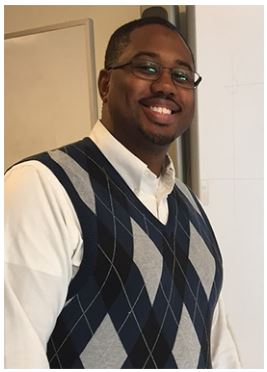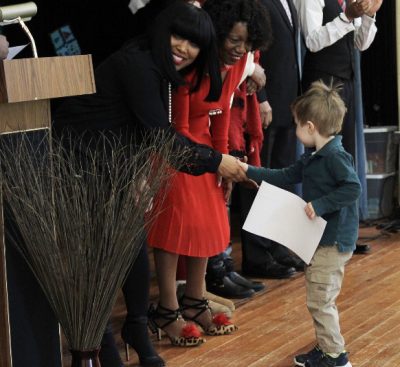
In our recurring 10 Questions series, the Neag School catches up with students, alumni, faculty, and others throughout the year to offer a glimpse into their Neag School experience and their current career, research, or community activities.
Neag School alumni Jamie S. Baker ’03 (ED), ’04 MA, and Ronall L. Cannada ’05 (ED), ’06 MA visited the UConn Storrs campus this past spring to attend the inaugural 2019 Black History Month Networking Night, held to connect students from UConn’s ScHOLA2RS House, led by the Neag School’s Erik Hines, with alumni and friends of the University.
Baker, invited by her nephew Darcus Henry, a ScHOLA2RS House resident recently accepted into the Neag School’s program for elementary education, is assistant principal at Ross/Woodward School in New Haven, Conn. Cannada serves as a social studies teacher and Positive Behavior Interventions System coach at CREC Great Hartford Academy of the Arts High School in Hartford, Conn. He is also the Black Males Achieving Education Leadership and Service (B-M.A.L.E.S.) facilitator at Greater Hartford Academy of the Arts.
They each reflect here on the impact of the event, as well as on their careers in education since graduating from the Neag School.
“During my tenure at UConn … I would enter many classes, and on a number of occasions be the only African American student in sight.”
— Jamie S. Baker ’03 (ED), ’04 MA
Where is your hometown?
JB: New Haven, Conn.
RC: Hartford, Conn.
What kind of impact did the ScHOLA2RS House Black History Month event have on you?
JB: Standing in a sea of young black men on the very same campus where I began my educational career two decades ago … left me with feelings of pride and a sense of camaraderie. The event reinvigorated me to begin to redefine my professional career and networks. The profound group of panelists provided the young scholars … with insight, raw experiences, and a sense of pride and encouragement. My nephew was transitioning into a young man with integrity and pride under the leadership of, and the tools provided by, those connected to the ScHOLA2RS House initiative.

RC: I [am] a program facilitator of a black male scholars program at the K-12 level. … I am inspired to implement a pipeline approach for young men of color in which self-efficacy is increased [after] attending ScHOLA2RS House and Neag School events. Young men of color thriving on a college campus can become agents of change with outreach to K-12 systems that struggle to display models of success from underserved communities. Students that reach back and teach others about their successful transition at an institution of higher education will provide inspiration for younger male students. For example, currently two of the current ScHOLA2RS House Black History program attendees were my past students at the CREC Academy of Aerospace and Engineering. I look forward to our upcoming symposium event with these young men as they continue to blossom in leadership roles.
From your perspective, why is ScHOLA2RS Houseimportant for our young men of color?
JB: During my tenure at UConn, the number of people of color was insanely low. I would enter many classes, and on a number of occasions be the only African American student in sight. Seeing young men of color at that stage of my educational career was a far-fetched idea. Although women of color have surpassed previous statistics, I am grateful that our young men are beginning to make gains. From what I am able to ascertain from discussions with my nephew, the ScHOLA2RS House initiative provides the encouragement, structures, and confidence for our young men of color to join and gain the tools for completion. In my eyes, this work is instrumental in helping break the social and racial barriers needed to elevate the level of access to educational success for our young men of color.
RC: As an educator, I believe any program that will increase the self-efficacy in higher education of young men of color is important, because higher education is a critical factor in today’s economy and social mobility of men. ScHOLA2RS House is creating a legacy of success for young men of color that will become the standard for the next generation of upcoming UConn students. Furthermore, the ScHOLA2RS House graduates will inspire others with their successful transition at a predominantly white institution of higher education.
Hines is furthering the vision of impactful Neag School pedagogy by providing practical and academic wisdom to the current UConn generation. It was quite apparent from the [Black History] event that Hines is succeeding at displaying the beauty and dignity of scholarly excellence. I believe his work can be categorized as an epitome of a well-rounded educational program that ensures academic success, character building, and fostering brotherhood.
What motivated you to become an educator?

JB: Initially, I was going for a degree in nursing. After an internship at Yale New Haven Hospital during my junior and senior year, I quickly came to the realization that helping people was the desire, but not in the field of health. Through research and experience, I realized that teaching would be just as suitable to meet my ultimate fulfillment. Once I began with my fieldwork during high school and upon acceptance to the Neag School, I felt like teaching was innate. Teaching gave me a platform to give “miniature adults” something that would forever belong to them — education!
RC: I wanted to provide leadership in education to help the next generation of students of color to receive high-quality education as they developed into future leaders of America. As a CREC open-choice student who was bused out of the inner city, I knew that the opportunities in education for many were lacking and wanted to contribute solutions for urban education.
What makes for a strong educator in today’s schools?
JB: Thinking of the current state of education, an educator must have passion. No longer can people look at teaching as a secure job with summers off. One must have passion that brings forth resilience, sensitivity to your audience, flexibility, and a will for continuous learning. As stated by Fredrick Douglas, “It is not light we need, but fire … not the gentle shower, but thunder. We need the storm, the whirlwind, and the earthquake.”We need those with the will to put in the demanding work of educating “miniature adults” with unyielding, seam-bursting passion that renders the desired results.
I would be remiss if I did not mention the formal training that is aligned to the new generation of learners. Without education programs that prepare new educators, many teachers will not make it through the first couple of years of teaching.
RC: Strong educators form strong relationships with their students and show that they care about them as people. Strong educators are also knowledgeable about their subject matter and are able to facilitate high levels of academic success through differentiation for all levels of abilities in the classroom.
“As an educator, I believe any program that will increase the self-efficacy in higher education of young men of color is important, because higher education is a critical factor in today’s economy and social mobility of men. ScHOLA2RS House is creating a legacy of success for young men of color that will become the standard for the next generation of upcoming UConn students.”
— Ronall L. Cannada ’05 (ED), ’06 MA
How did earning your degrees at the Neag School help your professional career?
JB: Prior to holding a position, I can recall interviewing with groups of people. When engaging in dialogue regarding pedagogy as well as experience in execution of learned theories, I almost instantly felt a boost of confidence upon the realization that the preparation from the Neag School of Education far surpassed those of schools up and down the coast. At times, I could recall mentioning the program I graduated from and eyes in the room would light up during interviews.
The passion coupled with theoretical knowledge and practice gave me great stamina and insight as a new educator. This resulted in recognition from supervisors and opportunities to lead and participate in district initiatives that have thrusted my career forward quite quickly.
RC: The Neag School of Education has a great reputation for excellence in the New England region, which made the job search easy because we were well prepared and highly sought after by school districts.
What are three words you would use to describe your UConn experience?
JB: Three words that I would use to describe my college experience would have to be transformative, stimulating, and inspiring. Transformative is indicative of my forced transformation from young adulthood to a defined adult. Growing up, I believe that my parents protected me from some of the realities of life. I knew the world brought forth challenges that forced growth, but I did not realize the harshness and hurt that would be in the winds of these growing pains. However, these experiences helped build my emotional intellect. I learned to read people and their intentions in a way that did not disrupt my drive to meet success by any means. I learned to adapt and shift when in certain environments. Overall, the environment at UConn was one of the most intellectually stimulating institutes that I have experienced. I walked away with a renewed level of confidence as well as inspiration to prove to the world that success is mine.
RC: Passionate, unforgettable, grateful.
What is one thing that most people perhaps don’t know about you, but that you believe gives you a valuable perspective as an educator?
JB: The struggles that I have had in life growing up in the depths of a city divided between the wealthy and poor by a matter of blocks has allowed me to see a multitude of perspectives and have an appreciation for all.
RC: People don’t realize how much of an introvert I really am because when you’re an educator, the show starts as soon as the students enter the room. My classes are highly energetic and engaging for students, as I try to incorporate popular culture and trends to spark interest in U.S history. However, as soon as students are not present, I’m back to my introverted self; this trait gives me a lot of room for introspection of my pedagogy.
What is your proudest career achievement?
JB: During my second year of teaching, I was promoted as a lead person on a reading initiative, which lead me to train around the nation and turnkey the information to help implement the literacy initiative in the district.
RC: My proudest career achievement was when I was hired to teach U.S history at CREC as an alumnus of the project concern program. In that program, I [had been] bused out of Hartford as a youth to a suburban district for 12 years, and the experience gave me the inspiration to give back and teach, to raise the academic standards in urban settings. Now as a professional educator, I believe that my career has come full circle … I am able to impact change in the exact way I envisioned as a senior in high school.
What is your favorite piece of advice that you have received over the course of your career?
JB: A perfectionist is slow to reach the finish line; get perfection from the work of the team, not you as the individual.
RC: Look for small wins that demonstrate you are having impact on one student in every class. Often, being an educator is overwhelming emotionally because you wonder if you are making an impact. Yet, by looking at one student every class to gauge impact, I believe that I am seeing the fruit of my hard work each and every class I teach.
Check out more information about ScHOLA2RS House. View photos from the Black History Month event.
 Facebook
Facebook
 Twitter
Twitter
 LinkedIn
LinkedIn
